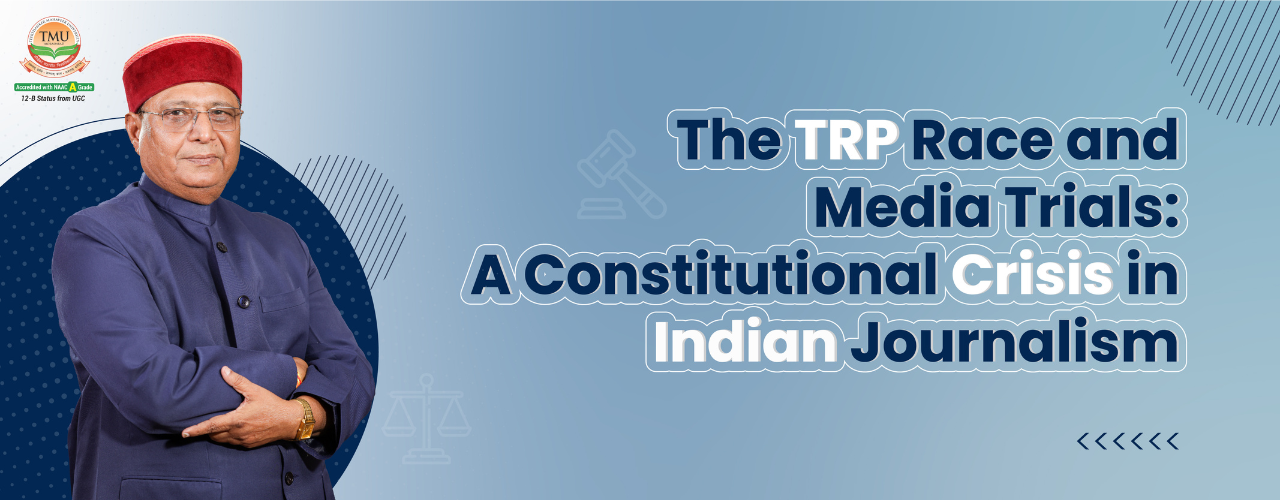The Toxic TRP Race: Media Trials and the Erosion of Judicial Independence
Table of Contents
By Prof. Harbansh Dixit
In recent days, a bench of the Bombay High Court, led by the Chief Justice, raised serious concerns about media trials, questioning the relevance of courts if the media becomes investigator, prosecutor, and judge. The case being heard was a Public Interest Litigation (PIL) that involved overreaching and sensational coverage of the Sushant Singh Rajput case and related incidents.
When Journalism Crosses the Line
Electronic media, under the guise of freedom of expression, defended its reporting by claiming it helps "solve" complex cases. However, the court reminded media channels of their duty to act within legal boundaries, not above them.
Television journalism, especially under the influence of TRP competition, has turned from fact-based reporting into sensationalism. In this race, truth and decency often take a backseat.
- Suspects are declared guilty before trial.
- Courts are pressured by public narratives.
- Journalistic objectivity is replaced by televised verdicts.
Teerthanker Mahaveer University
Apply for Admission
Click Here To Apply for Admission
Media Trials: Business Under the Mask of Freedom
The real tragedy lies not just in the commercial motives behind such reporting, but in how freedom of expression is misused. What is being done for profit is masked as a public service.
This behavior qualifies as contempt of court, especially under Section 2(c)(iii) of the Contempt of Courts Act, 1971, as it interferes with the course of justice.
Rights vs. Responsibilities: Where Media Fails
Yes, free press and independent judiciary are both pillars of democracy—but one cannot trample the other. An accused has the fundamental right to:
- A free and fair trial
- Be judged without public prejudice
But media trials destroy this, turning public opinion against the accused even before a court verdict.
Precedents and Judicial Warnings
The UK case of Attorney General vs. British Broadcasting Corporation (1981), and Indian cases like:
- Anuradha Bhasin vs. Union of India (2020)
- R.K. Anand vs. Registrar, Delhi High Court (2009)
- R. Rajagopal vs. State of Tamil Nadu (1994)
…have all highlighted the boundaries of press freedom and condemned prejudicial media reporting.
Yet, despite repeated warnings from the Supreme Court and High Courts, the practice continues unchecked in India—especially in the name of TRP gain.
Legal Efforts to Curb Media Trials: A History of Inaction
From 1994 to 2006, the Indian government attempted to frame legislation to control electronic media behavior at least seven times. The 2006 Broadcasting Services Regulation Bill aimed to:
- Curb media trials
- Prevent contempt of court
- Protect national security and public order
- Block content that incites violence or misinformation
But it was opposed on grounds of “freedom of the press”, and the government ultimately withdrew under pressure.
The Self-Regulation Myth
Critics of media laws often cite “self-regulation” as the best model. But recent events show this mechanism has utterly failed. Media houses continue to:
- Exploit emotional narratives
- Bypass facts for ratings
- Influence judicial proceedings
A PIL is currently pending in the Supreme Court, asking for a regulatory body to monitor and discipline electronic media. Unsurprisingly, many media houses oppose it, claiming it threatens their autonomy.
Freedom vs. License: A Democratic Dilemma
Let’s be clear—freedom of expression does not mean freedom to harm. No democracy grants unchecked rights. Even Presidents and Chief Justices are bound by constitutional limits, and so must be the media.
Unchecked rights breed anarchy, not liberty. When journalists take over the roles of judges and investigators, democracy itself is threatened.
Conclusion: India Needs a Law for Electronic Media Conduct
India must enact a dedicated law to regulate electronic media, especially to curb the destructive effects of the TRP race and media trials. Such a law should:
- Protect freedom of the press
- Punish violations like contempt of court and misinformation
- Balance public interest with individual rights
A vibrant democracy needs a free but disciplined press. It’s time to draw the line between journalism and judicial overreach.















